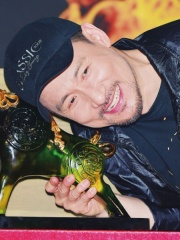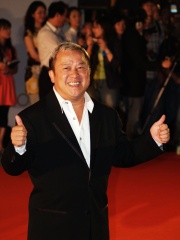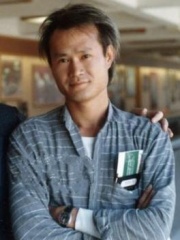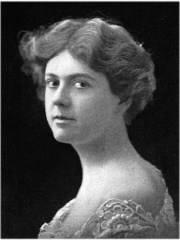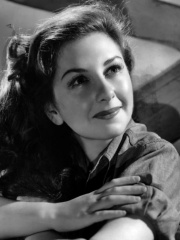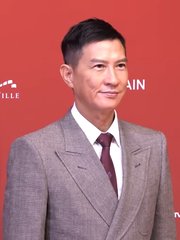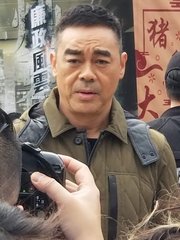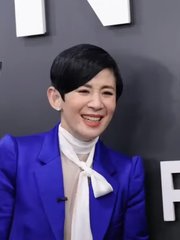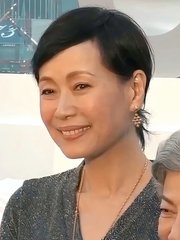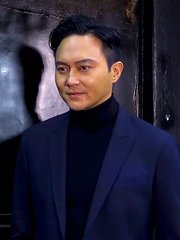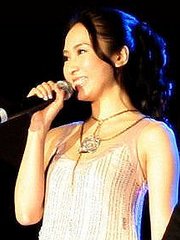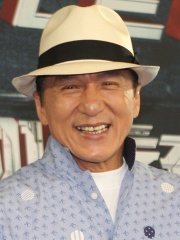
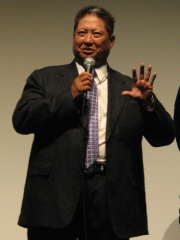
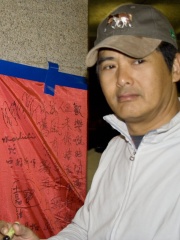
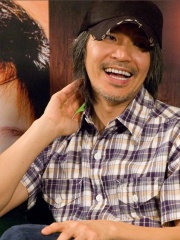
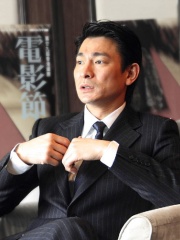
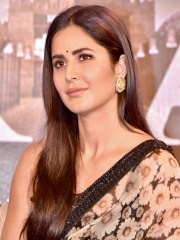
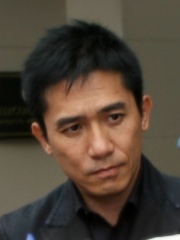

The Most Famous
ACTORS from Hong Kong
Top 10
The following people are considered by Pantheon to be the top 10 most legendary Chinese Actors of all time. This list of famous Chinese Actors is sorted by HPI (Historical Popularity Index), a metric that aggregates information on a biography's online popularity. Visit the rankings page to view the entire list of Chinese Actors.

1. Jackie Chan (b. 1954)
With an HPI of 81.82, Jackie Chan is the most famous Chinese Actor. His biography has been translated into 144 different languages on wikipedia.
Fang Shilong (born Chan Kong-sang; 7 April 1954), known professionally as Jackie Chan and Sing Lung, is a Hong Kong martial artist, actor and filmmaker, known for his slapstick, acrobatic fighting style, comic timing, and innovative stunts, which he typically performs himself. With a film career spanning more than sixty years, he is regarded as one of the most iconic and influential martial artists in the history of cinema. Films in which he has appeared have grossed over $6 billion worldwide. Starting as one of the Seven Little Fortunes at the China Drama Academy, where he was trained in acrobatics, martial arts and acting, Chan entered the Hong Kong film industry as a stuntman before making the transition to acting. His breakthrough came with the action comedy Snake in the Eagle's Shadow (1978). He then starred in similar action comedies such as Drunken Master (1978) and The Young Master (1980). He made his directorial debut with The Fearless Hyena (1979), which was a box office success. Throughout the 1980s, he was part of the "Three Dragons" along with Sammo Hung and Yuen Biao; the three starred in six Hong Kong films together. Project A (1983) saw the official formation of the Jackie Chan Stunt Team and established Chan's signature style of elaborate, dangerous stunts combined with martial arts and slapstick humor, a style he further developed in a more modern setting with Wheels on Meals (1984) and Police Story (1985). Rumble in the Bronx (1995), which had a successful worldwide theatrical run, brought Chan into the North American mainstream. By the mid-1990s, he was the most popular action movie star in Asia and Europe. Chan gained Hollywood success for portraying Chief Inspector Lee in the American buddy cop action comedy film Rush Hour (1998), a role he reprised in two sequels. He went on to work both in American and Chinese films, appearing in the Shanghai film series (2000–2003), New Police Story (2004), Rob-B-Hood (2006), Little Big Soldier (2010), Shaolin (2011), and The Shadow's Edge (2025), among others. The Forbidden Kingdom (2008) marked his first collaboration with fellow martial arts star Jet Li. He has played martial arts mentor Mr. Han in two Karate Kid films, the 2010 remake The Karate Kid and Karate Kid: Legends (2025). For CZ12 (2012), he earned two Guinness World Records for "Most Stunts Performed by a Living Actor" and "Most Credits in One Movie". He played against type in Shinjuku Incident (2009) and The Foreigner (2017). His voice acting work includes all three Chinese versions of Mulan (1998), the first three films in the Kung Fu Panda franchise (2008–2016), and Teenage Mutant Ninja Turtles: Mutant Mayhem (2023). One of the most recognizable and influential film personalities in the world, Chan was described by film scholar Andrew Willis in 2004 as perhaps "the most recognized star in the world." He has received fame stars on the Hong Kong Avenue of Stars and the Hollywood Walk of Fame, as well as an honorary Academy Award in 2016. Chan has been referenced in various pop songs, films, television series, and video games. He has an award named after him, the Jackie Chan Action Movie Awards. He is an operatically trained vocalist who has released several pop music albums and performed theme songs for some of the films in which he starred. He is also a philanthropist and was named one of the top 10 most charitable celebrities by Forbes in 2011. In 2016, Forbes ranked him the second-highest-paid actor in the world. In 2025, Parade estimated his net worth to be $400 million, and reported he planned to leave his fortune to charity, rather than to his son, Jaycee Chan.

2. Sammo Hung (b. 1952)
With an HPI of 71.16, Sammo Hung is the 2nd most famous Chinese Actor. His biography has been translated into 41 different languages.
Samuel "Sammo" Hung Kam-bo (Chinese: 洪金寶; Jyutping: Hung4 Gam1-bou2; born 7 January 1952) is a Hong Kong actor, martial artist, and filmmaker, known for his work in martial arts films, Hong Kong action cinema, and as a fight choreographer for other actors such as Kim Tai-chung, Jackie Chan, Yuen Biao, and Yuen Wah. Hung is one of the pivotal figures who spearheaded the Hong Kong New Wave movement of the 1980s, helped reinvent the martial arts genre and popularized the zombie-like jiangshi genre. He is widely credited with assisting many of his compatriots, giving them their starts in the Hong Kong film industry, by casting them in the films he produced, or giving them roles in the production crew. Both Sammo Hung and Jackie Chan were often addressed as "Dai Goh", meaning "Big Brother", until the filming of Project A (1983), which featured both actors. As Hung was the eldest of the kung fu "brothers", and the first to make a mark on the industry, he was given the nickname "Dai Goh Dai", meaning "Big, Big Brother", or "Biggest Big Brother".

3. Chow Yun-fat (b. 1955)
With an HPI of 70.08, Chow Yun-fat is the 3rd most famous Chinese Actor. His biography has been translated into 57 different languages.
Chow Yun-fat SBS (born 18 May 1955), previously known as Donald Chow, is a Hong Kong actor and filmmaker. In a film career spanning more than forty-five years, Chow has appeared in over 100 television drama series and films. Known for his versatility, encompassing action and melodrama, comedy and historical drama, his accolades include three Hong Kong Film Awards for Best Actor and two Golden Horse Awards for Best Actor. Chow was propelled to fame by TVB dramas such as The Good, The Bad And The Ugly (1979) and The Bund (1980). His first acclaimed film was the Hong Kong political drama The Story of Woo Viet (1981), in which he played a Vietnamese refugee struggling to reach the United States. He is known for his collaborations with filmmaker John Woo in five Hong Kong action films: A Better Tomorrow (1986), which made Chow a box-office superstar in Asia, A Better Tomorrow II (1987), The Killer (1989), Once a Thief (1991), and Hard Boiled (1992). He also starred in the video game Stranglehold (2007), produced by Woo. Chow also made several popular action films with Hong Kong director Ringo Lam, including City on Fire (1987), Prison on Fire (1987), and Full Contact (1992). Chow is credited for bringing Hong Kong gangster films to world prominence. His other notable Hong Kong and Chinese films include An Autumn's Tale (1987), God of Gamblers (1989), All About Ah-Long (1989), Curse of the Golden Flower (2006), Let the Bullets Fly (2010), From Vegas to Macau (2014), and Project Gutenberg (2018). Chow made his Hollywood debut in The Replacement Killers (1998). He is also known in the West for The Corruptor (1999), Anna and the King (1999), Crouching Tiger, Hidden Dragon (2000), Bulletproof Monk (2003), and Pirates of the Caribbean: At World's End (2007).

4. Stephen Chow (b. 1962)
With an HPI of 66.54, Stephen Chow is the 4th most famous Chinese Actor. His biography has been translated into 43 different languages.
Stephen Chow Sing-chi (Chinese: 周星馳; born 22 June 1962) is a Hong Kong filmmaker and former actor, known for his mo lei tau comedy, which has a significant influence on Chinese popular culture. His career began in television, where he gained recognition through variety shows and TV dramas. Chow's breakthrough came in 1989 with the comedy dramas The Final Combat and The Justice of Life, the latter marking the beginning of his on-screen collaboration with Ng Man-tat. He consecutively broke Hong Kong’s box office records in the next two years with films All for the Winner (1990) and Fight Back to School (1991), cementing his status as one of the region's most popular comedic actors. Since the early 1990s, Chow began working as a screenwriter and director, serving as a de facto director for Flirting Scholar (1993) before receiving his first directorial credit with From Beijing with Love (1994). His first two attempts at Hong Kong–mainland co-productions, Flirting Scholar and A Chinese Odyssey (1995), received mixed reviews and underperformed at the box office in both markets upon release. However, they gained popularity over time, and by the 2000s, A Chinese Odyssey had particularly elevated his status as a cultural icon in China. In 2001, he directed and starred in Shaolin Soccer (2001), which brought him international recognition, furthered by Kung Fu Hustle (2004). His final on-screen performance was in CJ7 (2008), after which he transitioned fully to filmmaking, achieving great success with comedies such as Journey to the West (2013) and The Mermaid (2016).
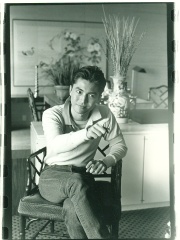
5. John Lone (b. 1952)
With an HPI of 65.56, John Lone is the 5th most famous Chinese Actor. His biography has been translated into 24 different languages.
John Lone (Chinese: 尊龍; Jyutping: zyun1 lung4; pinyin: Zūn Lóng; born October 13, 1952) is a Chinese-American retired actor. He starred as Puyi in the Academy Award-winning film The Last Emperor (1987), for which he was nominated for a Golden Globe Award for Best Actor. A veteran of the East West Players, he appeared in numerous high-profile screen and stage roles throughout the 1980s, 1990s and early 2000s, in films like Iceman, Year of the Dragon, M. Butterfly, The Shadow, and Rush Hour 2. He was nominated for the Independent Spirit Award for Best Supporting Male for his performance in The Moderns.

6. Andy Lau (b. 1961)
With an HPI of 65.16, Andy Lau is the 6th most famous Chinese Actor. His biography has been translated into 42 different languages.
Andy Lau Tak-wah (Chinese: 劉德華; Jyutping: Lau4 Dak1 Waa4; born Lau Fook-wing; 27 September 1961), is a Hong Kong actor, singer-songwriter, film producer, and philanthropist. He was named the "Fourth Tiger" among the Five Tiger Generals of TVB in the 1980s as well as one of the Four Heavenly Kings in the 1990s. Lau won the Hong Kong Film Award for Best Actor three times, the Golden Horse Award for Best Leading Actor twice, and was entered into the Guinness World Records for the "Most Awards Won by a Cantopop Male Artist" in 2000, with a total of 444 music awards by 2006. In 2018, Lau became a member of the Academy of Motion Picture Arts and Sciences. In 2024, Lau was elected vice chairman of the 11th China Film Association. Over a career of four decades, Lau has been one of the most commercially and critically successful artists in the Chinese-speaking world.

7. Katrina Kaif (b. 1983)
With an HPI of 65.02, Katrina Kaif is the 7th most famous Chinese Actor. Her biography has been translated into 80 different languages.
Katrina Kaif (pronounced [kəˈʈriːna kɛːf]; born Katrina Rosemary Turcotte, 16 July 1983) is a British actress who works in Hindi-language films. One of India's highest-paid actresses, she has received various accolades, including four Screen Awards and four Zee Cine Awards, alongside three Filmfare Awards nominations. Although critical reception to her acting has varied, she is noted for her roles in action films and her dancing ability. Born in British Hong Kong, Kaif lived in several countries before moving to London, where she spent three years. She received her first modelling assignment as a teenager and later pursued a career in fashion modelling. At a fashion show in London, Indian filmmaker Kaizad Gustad cast her in Boom (2003), which was a critical and commercial failure. While Kaif established a successful modelling career in India, she initially faced difficulty securing film roles due to her limited command of Hindi. After appearing in the Telugu film Malliswari (2004), Kaif achieved commercial success in Bollywood with the romantic comedies Maine Pyaar Kyun Kiya? (2005) and Namastey London (2007). Further success followed with a series of box-office hits, though she was criticised for her acting, repetitive roles, and preference for male-dominated films. Kaif's performances in the thriller New York (2009) and the romantic comedy Mere Brother Ki Dulhan (2011) were better received, earning her nominations for the Filmfare Award for Best Actress. Her career progressed with roles in Ajab Prem Ki Ghazab Kahani (2009), Raajneeti (2010), and Zindagi Na Milegi Dobara (2011). She found major commercial success in the action thrillers Ek Tha Tiger (2012), Dhoom 3 (2013), and Bang Bang! (2014), which ranked among the highest-grossing Indian films of that decade. Following a brief setback, the action films Tiger Zinda Hai (2017), Sooryavanshi (2021), and Tiger 3 (2023), along with the drama Bharat (2019), emerged as box-office hits. Kaif's portrayal of an alcoholic actress in the romantic drama Zero (2018) earned her the Zee Cine Award for Best Supporting Actress and her performance in the mystery thriller Merry Christmas (2024) was well-received. In the media, Kaif frequently appears in listings of India’s most popular and attractive celebrities. A regular brand endorser, she launched her cosmetic line Kay Beauty in 2019. She participates in stage shows and is involved with her mother’s charity, Relief Projects India, which helps underprivileged children. Kaif is married to actor Vicky Kaushal, with whom she has a son.

8. Tony Leung Chiu-wai (b. 1962)
With an HPI of 65.00, Tony Leung Chiu-wai is the 8th most famous Chinese Actor. His biography has been translated into 36 different languages.
Tony Leung Chiu-wai (Chinese: 梁朝偉; Jyutping: Loeng4 Ciu4wai5, born 27 June 1962) is a Hong Kong actor and singer. He is one of Asia's most successful and internationally recognized actors. He has won many international acting prizes, including the Cannes Film Festival award for Best Actor for his performance in Wong Kar-wai's film In the Mood for Love. He was named by CNN as one of "Asia's 25 Greatest Actors of All Time". Leung is known for his collaborations with director Wong Kar-wai, with whom he has worked in seven films, including Chungking Express (1994), Happy Together (1997), In the Mood for Love (2000), 2046 (2004), and The Grandmaster (2013). He also appeared in three Venice Film Festival Golden Lion-winning films: A City of Sadness (1989), Cyclo (1995) and Lust, Caution (2007), directed by Ang Lee. Leung also starred in the Academy Award-nominated film Hero (2002), the cult classic Hard Boiled (1992), and box office hits Infernal Affairs (2002) and Red Cliff (2008). He later came to prominence in Hollywood with his role in Shang-Chi and the Legend of the Ten Rings (2021). Leung has an extensive list of awards that he has won in a career that began in the 1980s. For In the Mood for Love, Leung earned the Best Actor award at the Cannes Film Festival. He is also an eight-time winner at the Hong Kong Film Awards and three-time winner at the Golden Horse Film Awards, holding the record for most awards in the Best Actor category. The 2002 book East Asian Film Stars describes Leung as "undoubtedly one of the most successful and widely-acclaimed Hong Kong actors of his generation, with a broad and diverse filmography." In 2023, he became the first male actor to win the "Grand Slam", after winning Best Actor at the three most prestigious Chinese-language film awards: the Golden Horse Awards, the Hong Kong Film Awards and the Golden Rooster Awards.

9. Nora Miao (b. 1952)
With an HPI of 64.11, Nora Miao is the 9th most famous Chinese Actor. Her biography has been translated into 22 different languages.
Nora Miao (Chinese: 苗可秀; Jyutping: miu4 ho2 sau3, born Chan Wing-man (陳詠憫); 8 February 1952) is a Hong Kong film actress. She is best known for appearing in many kung fu films in the 1970s, opposite Hong Kong action film stars such as Bruce Lee and Jackie Chan.
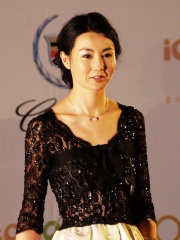
10. Maggie Cheung (b. 1964)
With an HPI of 63.32, Maggie Cheung is the 10th most famous Chinese Actor. Her biography has been translated into 48 different languages.
Maggie Cheung (Cheung Man-yuk; Chinese: 張曼玉; pinyin: Zhāng Mànyù; born 20 September 1964) is a Hong Kong actress. She is considered to be one of the most successful and internationally acclaimed actresses in Asia. Cheung is the recipient of numerous accolades, including six Hong Kong Film Awards and five Golden Horse Awards, holding the record for most awards in the Best Actress category. Internationally, she is best known for winning the Silver Bear for Center Stage (1991) and the Cannes Film Festival Award for Clean (2004), making her the first Asian actress to receive the latter and the only Asian actress to have won Best Actress awards at two of the three major European film festivals. Cheung first rose to prominence in the 1980s, gaining wide recognition through her collaboration with Jackie Chan in the 'Police Story' movies. She quickly expanded her work from commercial action and comedy to dramatic roles, appearing in films such as As Tears Go By (1988), Days of Being Wild (1990), Irma Vep and Comrades, Almost a Love Story (both 1996). Her international breakthrough came with Wong Kar-wai's In the Mood for Love (2000), which not only gained her worldwide fame but also received widespread acclaim, ranking fifth on Sight & Sound magazine's 2022 list of the top 100 films in film history. The website of Entertainment Weekly in the United States once listed the "51 classic performances overlooked by the Oscars" in the 86-year history of the Oscars, and Cheung's performance in In the Mood for Love became one of the only two Asian performances on the list. Since the late 2000s, Cheung has largely stepped back from acting, making only occasional public appearances at festivals, fashion events, and industry ceremonies. Beyond acting, she has taken on selective creative and philanthropic roles, including serving as a UNICEF ambassador.
People
Pantheon has 75 people classified as Chinese actors born between 1876 and 1998. Of these 75, 72 (96.00%) of them are still alive today. The most famous living Chinese actors include Jackie Chan, Sammo Hung, and Chow Yun-fat. The most famous deceased Chinese actors include Lam Ching-ying, Clara Blandick, and Joan Lorring. As of April 2024, 16 new Chinese actors have been added to Pantheon including Nick Cheung, Francis Ng, and Sean Lau.
Living Chinese Actors
Go to all RankingsJackie Chan
1954 - Present
HPI: 81.82
Sammo Hung
1952 - Present
HPI: 71.16
Chow Yun-fat
1955 - Present
HPI: 70.08
Stephen Chow
1962 - Present
HPI: 66.54
John Lone
1952 - Present
HPI: 65.56
Andy Lau
1961 - Present
HPI: 65.16
Katrina Kaif
1983 - Present
HPI: 65.02
Tony Leung Chiu-wai
1962 - Present
HPI: 65.00
Nora Miao
1952 - Present
HPI: 64.11
Maggie Cheung
1964 - Present
HPI: 63.32
Jacky Cheung
1961 - Present
HPI: 61.23
Eric Tsang
1953 - Present
HPI: 60.38
Deceased Chinese Actors
Go to all RankingsLam Ching-ying
1952 - 1997
HPI: 59.77
Clara Blandick
1876 - 1962
HPI: 55.98
Joan Lorring
1926 - 2014
HPI: 50.43
Newly Added Chinese Actors (2025)
Go to all RankingsNick Cheung
1964 - Present
HPI: 53.98
Francis Ng
1961 - Present
HPI: 52.65
Sean Lau
1964 - Present
HPI: 51.36
Sandra Ng
1965 - Present
HPI: 49.29
Wallace Chung
1974 - Present
HPI: 48.88
Carrie Ng
1963 - Present
HPI: 48.45
Cecilia Yip
1963 - Present
HPI: 48.19
Julian Cheung
1971 - Present
HPI: 47.94
Philip Ng
1977 - Present
HPI: 47.85
Gigi Lai
1971 - Present
HPI: 47.71
Stephen Fung
1974 - Present
HPI: 47.56
Josie Ho
1974 - Present
HPI: 45.51
Overlapping Lives
Which Actors were alive at the same time? This visualization shows the lifespans of the 3 most globally memorable Actors since 1700.

